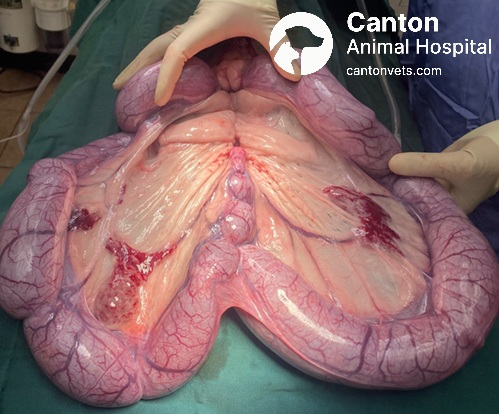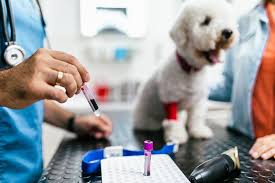Home | Surgeries | Pyometra Surgery for Dogs & Cats
Pyometra Surgery for Dogs & Cats
Pyometra Surgery for Dogs & Cats
At Canton Animal Hospital, we provide lifesaving pyometra surgery for dogs and cats suffering from this serious uterine infection. Pyometra is a life-threatening condition that occurs when bacteria infect the uterus, leading to pus accumulation and severe illness. Without immediate treatment, pyometra can cause sepsis, organ failure, and even death. Our experienced veterinary team specializes in emergency and elective surgical procedures to treat this condition and restore your pet’s health.
The most effective treatment for pyometra is surgical removal of the infected uterus and ovaries (an emergency spay procedure). Prompt medical intervention is crucial to prevent complications and ensure a full recovery.
Types of Pyometra
Open Pyometra – The cervix remains open, allowing pus to drain, which can be observed as a vaginal discharge.
Closed Pyometra – The cervix is closed, trapping the infection inside the uterus, making it more dangerous and harder to diagnose.
Signs Your Pet May Have Pyometra
Lethargy and weakness
Loss of appetite and vomiting
Swollen or bloated abdomen
Increased thirst and urination
Foul-smelling vaginal discharge (if open pyometra)
Fever and signs of discomfort
Rapid breathing or difficulty standing
Featured Resources

We Welcome New Patients!
We're always happy to give your furry friend care at our hospital. Get in touch today!
Contact Us
How Pyometra is Diagnosed
Physical Examination – Evaluating symptoms such as fever, lethargy, and abdominal swelling.
Blood Tests – Checking for infection, elevated white blood cell count, and kidney function.
Ultrasound Imaging – Identifying fluid-filled uterine enlargement and confirming the presence of infection.
X-rays (Radiographs) – Assessing the size of the infected uterus and ruling out other conditions.
Urinalysis – Detecting secondary infections or kidney involvement.
Differential Diagnosis
Pregnancy – An enlarged uterus may be mistaken for pregnancy on imaging.
Metritis – A uterine infection that occurs postpartum, which can present similar symptoms.
Mucometra or Hydrometra – Accumulation of mucus or fluid in the uterus without infection.
Gastrointestinal Disorders – Vomiting, lethargy, and abdominal swelling can also result from GI obstructions or infections.
Urinary Tract Infections (UTIs) – Increased thirst, urination, and fever can mimic signs of pyometra.
Pyometra Surgery & Treatment
Emergency Ovariohysterectomy (Spay Surgery) – The most effective treatment for pyometra, involving the complete removal of the infected uterus and ovaries. This surgery eliminates the infection and prevents future occurrences.
Pre-Surgical Stabilization – Before surgery, affected pets may require intravenous (IV) fluids, antibiotics, and supportive care to stabilize their condition and reduce the risk of complications.
Surgical Procedure – Under general anesthesia, an incision is made in the abdomen to carefully remove the infected uterus and ovaries. The surgeon ensures that no infection spreads during the procedure.
Anesthesia & Monitoring – Our team uses advanced anesthesia protocols and continuously monitors vital signs, ensuring a safe and smooth surgery.
Post-Surgical Recovery Monitoring – After surgery, pets are monitored closely for pain management, infection prevention, and overall recovery progress.
Non-Surgical Treatment (Rare Cases) – In high-risk surgical candidates, hormonal therapy and antibiotics may be considered, but surgery remains the gold standard for effective treatment.
Post-Surgery Care & Recovery
Strict Rest & Limited Movement – Preventing strain on the surgical site to ensure proper healing.
Medication & Pain Management – Administer prescribed antibiotics and pain relievers as directed.
Incision Care & Monitoring – Watch for swelling, redness, or discharge at the surgical site.
Nutritional Support & Hydration – Encourage eating and drinking to aid recovery and prevent dehydration.
Follow-Up Veterinary Appointments – Regular checkups to track healing progress and remove sutures if necessary.
Complications After Pyometra Surgery
Infection at the Surgical Site – Redness, swelling, or discharge may indicate a post-operative infection.
Delayed Healing – Pets with underlying conditions may take longer to recover.
Suture Reactions – Some pets may experience irritation or mild inflammation around the sutures.
Anesthetic Side Effects – Temporary grogginess, nausea, or lethargy may occur post-surgery.
Secondary Infections – In rare cases, bacteria may spread before surgery, requiring additional antibiotic therapy.
Organ Complications – Severe infections can sometimes cause kidney or liver issues that require further treatment.
Expected Outcome After Surgery
Full Recovery in Most Cases – With timely surgery, the majority of pets recover completely and return to normal activity levels.
Low Risk of Recurrence – Once the uterus is removed, pyometra cannot reoccur.
Improved Overall Health – Resolution of infection leads to increased energy, improved appetite, and overall well-being.
Shorter Hospitalization Period – Most pets are discharged within 24-48 hours post-surgery with proper monitoring.
Preventive Benefits – Spayed pets are no longer at risk for pyometra or related reproductive diseases.
Schedule an Emergency Pyometra Surgery Consultation
If your pet is showing signs of pyometra, Canton Animal Hospital provides emergency surgical care to save lives.
Call us immediately or Book an Appointment Online for urgent veterinary assistance.
Expert Pyometra Surgery for Dogs & Cats in Michigan
Frequently Asked Questions About Pyometra In Dogs & Cats
Pyometra is a life-threatening infection. Here are answers to common questions about its causes, prevention, and treatment.
Related Surgeries Articles
Looking for advice about caring for your pet? Our blog features helpful tips and educational material from our team to support your needs.

Pre-Surgical Screening for Pets: Ensuring a Safe Procedure
Preparing your pet for surgery? Prior to any procedure, it's important to take certain steps to ensure their safety and minimize risk. From pre-surgical testing to anesthetic monitoring, learn how to best prepare your furry friend for surgery.
Read MoreFeatured Resources

We Welcome New Patients!
We're always happy to give your furry friend care at our hospital. Get in touch today!
Contact Us
